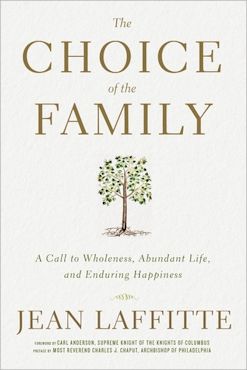
|
Posted October 27, 2015
Book: The Choice of the Family: A Call to wholeness, abundant life, and enduring happiness Author: Jean Laffitte Image Books. New York. 2015. Pp. 174 An Excerpt from the Jacket:
[Jean Laffitte] the head of the Pontifical Council on the Family at the Vatican focuses on the intricacies of family and provides theological and practical insight to deepen our relationships with our parents, children, brothers and sisters, and ultimately, God. When the Catholic Church speaks of "vocation" she means the "calling out" of each human person to accomplish a task preordained by God in co-redemption of the world. Every human being has a vocation God created each individual soul with a specific purpose in mind. Thus, the greatest joy for a Christian is pursuing the purpose for which God created him or her. For Christians, marriage is a vocation. In this series of interviews and reflections, Bishop Laffitte stresses the importance of the family in the twenty-first century and issues a call to action for everyone to reinvigorate the teachings of Jesus in his or her day-to-day life. An Excerpt from the book: "But being united, does that also mean for example that one tries to have as much patience for the faults of another as one would need to have for one's own? Is it necessary, like Saint Francis de Sales, to try to forbid what he call "rash judgment," which involves fitting the other into the idea one has of him, something that obviously has an impact on the quality of relations between spouses? When one lives within the intimacy of a family, do sins of thought have a profound impact on the quality of the general atmosphere? J.L. I believe it absolutely, and it is very correct: there is neither neutrality or indifference in thoughts. Many people imagine that to the degree they have not acted badly, they haven't faltered. Few people are conscious of the importance, and at times of the gravity, of sins of thought. Men are not infallible. No man has perfect mastery of his thoughts; the spirit can allow itself to be captivated by bad suggestions and reckless judgments. It is reasonable to be sufficiently aware of it. It is true that rash judgments wound, eat away at, and impede the communication of grace, as well as the communication between persons, simply put. Rash judgments give birth to suspicions, doubts, wariness of the other, and various movements of which we need to be watchful. How? By keeping the memory of God in our heart and thoughts. Saint Augustine called this recordatio, or literally, "memory of the heart." Prayer helps in this domain. It is impossible always to keep guard over an evenness of tone, mood, and thought, especially when our spirit and heart are not indwelt by the thought of God. The Christian must be very convinced of this. Table of Contents: Introduction by Carl Anderson Preface by Archbishop Charles Chaput 1. Your journey 2. Engagement: giving one's faith 3. Divine love and human love: faith and fidelity 4. Free love and free love in God: fidelity and freedom 5. Two names of fidelity: obedience and authority 6. The school of love and the chain of living. |
|
